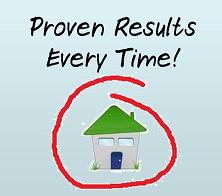By law, sellers are required to disclose all known defects regarding the property and buyers will have the right to approve what the sellers discloses and thereby move forward with the purchase of the home. However, what most sellers do is mindlessly mark down that they don’t know about anything down the line for every section. This can be dangerous for a seller especially if they know there is a defect with the home and knowingly or mistakenly, in writing say they don’t know about it on the disclosure statements.
Will the buyer know about it right away? Nope, they will have no idea until they feel the effects of whatever the defect is. However, what a buyer can do is go after the seller for failure to disclose what they do know since by law that is a seller responsibility. The seller will then be responsible for the repair and end up having to foot the bill since the defect was known and not disclosed to the buyer.
In a real life situation, my client, George, bought a home and a few weeks later he discovered a major leak. The seller had failed to disclose this and he was easily able to prove that the seller had knowledge of this and didn’t disclose because the leak stains were covered up in paint. The seller had intent to hide this problem. This is not the way for sellers to go. In real estate as well as in life, it is always better to be honest in everything we do. The seller had to foot the bill and take care of it.

Buyers in turn need to understand what it means to approve all the disclosures. Pretty much as long as a seller discloses a defect and you approve it, the seller is off the hook for that specific defect. If a seller tells you there’s a hole in the roof where rain water pours in, come Winter when that rain pours through that hole in the ceiling, you can’t go after the seller after it has been disclosed to you, and you okayed it. So make sure you understand what’s disclosed before approving it.
Don’t expect too much out of a disclosure either. Sellers are only required to disclose to you what they actually know. They aren’t responsible for investigating further or paying for a professional to look into the home. You would have to get inspectors on your own which is why a professional home inspection is always recommended. I will go more into that another time.
Simply put, it’s like buying a car and the seller tells you it can go from 0 to 60 mph in 3 seconds, and there are minor damages to the brakes on the right side of the car, but the seller hasn’t driven the car in 5 years and that is honestly to the sellers best of knowledge. The info may be wrong, it may take 15 seconds instead of 3 and all the brakes are do not work at all, but the seller has performed the required seller duties by disclosing what is known best to their knowledge. Nothing more is required. The seller does not need to pay for a professional to verify anything for you. You are however, allowed to do your own investigations and verify all aspects of what you are buying on your own.
Real estate disclosures in a nutshell works exactly like that. So next time you are dealing with real estate disclosures, take them seriously.
If you have any questions, feel free to contact James Y. Kuang at (626) 371-5662 or by email - james.kuang@coldwellbanker.com
www.cbprosperity.ca
www.facebook.com/JamesYKuang
